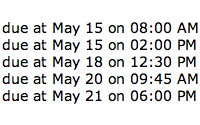#31 Formatting Time
May 14, 2007 | 5 minutes | Active Support, Views
Learn how to use the trusty strftime method to format a time, and see how Rails allows you to save this format for later use.
Form Objects
Models have a tendency to become a complex mess as an application grows. In this episode you will learn a couple of techniques to extract form-behavior out into its own class.
(18 minutes)
Model Caching (revised)
Caching at a low level is a great option when the view is too dynamic to cache and you need something flexible that can work anywhere in the application. Here I show a variety of ways to use Rails.cache with Active Record.
(12 minutes)
Upgrading to Rails 4
With the release of Rails 4.0.0.rc1 it's time to try it out and report any bugs. Here I walk you through the steps to upgrade a Rails 3.2 application to Rails 4.
(12 minutes)
Handling Exceptions (revised)
By default, Rails will render a static error file when an exception occurs in production. Here you will learn how to fully customize this behavior and render dynamic error pages.
(11 minutes)
Fast Tests
A slow test suite can put a damper on test-driven development. In this episode I show a variety of ways to optimize specs including: selective testing, preloading Rails, and testing outside of Rails.
(17 minutes)







